How Much Water Should A Cats Drink?
Cats should drink approximately 3.5 to 4.5 ounces of water per 5 pounds of body weight daily. Proper hydration is crucial for a cat’s overall health and well-being.
Water intake can vary based on diet, environmental conditions, and activity level. Monitoring your cat’s water consumption and providing fresh water at all times is essential for their health. We will explore the importance of water for cats, signs of dehydration, and tips to encourage proper hydration.
By understanding the factors that influence a cat’s drinking habits, pet owners can better ensure their feline friends stay properly hydrated. So, let’s delve into the essential role of water in a cat’s diet and ways to promote adequate hydration.
1. Importance Of Hydration For Cats
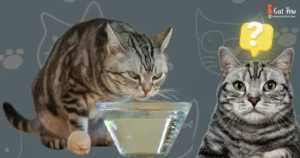
Proper hydration is crucial to a cat’s overall health and well-being. With cats being notoriously picky about their water intake, ensuring they get enough fluids is of paramount importance. The importance of hydration for cats cannot be overstated, as adequate water consumption plays a vital role in maintaining their health. Let’s delve into the physiological functions related to hydration and the risks associated with dehydration in felines.
Physiological Functions
Cats require water for various physiological functions, including maintaining body temperature, aiding in digestion, and keeping their skin and coat healthy. Water also facilitates the elimination of waste products and toxins from the body, supporting kidney function and preventing urinary tract issues. Adequate hydration is essential for maintaining overall organ function and supporting the immune system.
Dehydration Risks
Dehydration poses serious risks to feline health. Some cat dehydration symptoms to watch out for include sunken eyes, dry and tacky gums, lethargy, and decreased skin elasticity. Underlying health conditions, such as kidney disease or diabetes, can further elevate dehydration risks in cats. Lack of water intake can lead to urinary tract infections, constipation, and even organ failure in severe cases. Therefore, it’s imperative to ensure that your cat receives sufficient water intake to mitigate these risks.
2. Factors Affecting Cat’s Water Intake
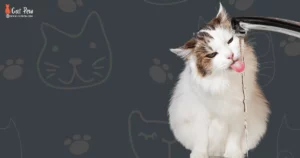
When it comes to maintaining your cat’s health, ensuring they drink an adequate amount of water is crucial. Several factors can influence a cat’s water intake. Understanding these factors can help you ensure that your furry friend is staying properly hydrated.
Age
The age of a cat can significantly impact their water intake. Kittens typically have higher water requirements compared to adult cats. As they grow, their hydration needs may change. Keeping an eye on your cat’s water consumption is crucial, especially during their formative years.
Health Conditions
Various health conditions can affect how much water a cat should drink. Conditions such as kidney disease or diabetes can increase thirst, leading to higher water intake. On the other hand, certain illnesses or medications may cause a decrease in thirst. Monitor your cat’s water consumption and consult with a veterinarian if you notice any significant changes, as it could be a sign of an underlying health issue.
Diet Type
The type of diet your cat consumes can also influence their water intake. Cats that eat primarily dry food may need to drink more water compared to those on a wet food diet, as dry food contains less moisture. Understanding your cat’s dietary needs and providing access to clean, fresh water at all times can help ensure they remain adequately hydrated.
3. Monitoring Your Cat’s Water Intake
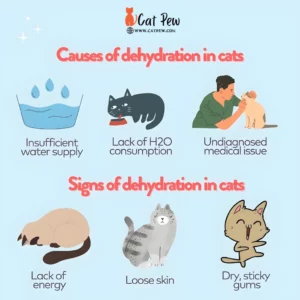
Monitoring your cat’s water intake is crucial for maintaining their overall health. Since cats are highly susceptible to dehydration, it’s essential to keep a close eye on their water consumption. By being vigilant and proactive, you can prevent potential health issues and ensure that your feline friend remains hydrated at all times.
Signs Of Dehydration
Recognizing the signs of dehydration is vital in ensuring your cat’s well-being. Some cat dehydration symptoms include dry, tacky gums, loss of skin elasticity, sunken eyes, and lethargy. If you notice any of these signs, it’s important to address the issue promptly by encouraging your cat to drink more water or seeking veterinary attention.
Measuring Water Consumption
Measuring your cat’s water intake can provide valuable insights into their hydration levels. Keep track of how much water your cat drinks on a daily basis. This can be done by monitoring the water level in their bowl or using a specific measuring cup to ensure accuracy. Regular monitoring can help in identifying any sudden changes in water consumption, which could indicate an underlying health concern.
4. Recommended Water Intake For Cats
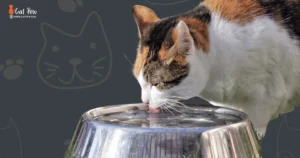
When it comes to our beloved feline friends, understanding their water intake needs is crucial for ensuring their overall health and well-being. The amount of water that a cat should drink can vary depending on various factors such as age, activity level, and diet. In this article, we will explore the recommended water intake for cats, along with general guidelines and factors to consider when adjusting their water intake.
General Guidelines
As a general rule of thumb, cats typically require approximately ½ to 1 ounce of water per pound of body weight per day. This equates to roughly 60-120 ml of water for a 10-pound cat. However, it’s important to remember that individual cats may have specific needs that differ from these general guidelines.
Adjusting For Various Factors
When determining the appropriate water intake for your cat, it’s essential to consider several factors:
- Age: Kittens and senior cats may have different hydration needs compared to adult cats.
- Diet: Cats on a dry food diet may require more water compared to those consuming wet food.
- Health Conditions: Certain medical conditions such as kidney disease or diabetes can impact a cat’s water intake requirements.
- Environmental Factors: Hot weather, high activity levels, and humidity can influence a cat’s hydration needs.
5. Promoting Hydration In Cats
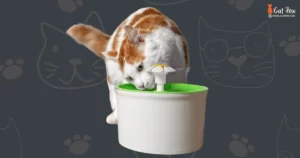
Cats, like humans, need a sufficient intake of water for their overall health and well-being. Many cats do not drink enough water, which can lead to potential health issues such as urinary tract problems and kidney disease. Therefore, cat owners must take proactive measures to ensure their feline companions are adequately hydrated. This can be achieved through a combination of dietary strategies and providing access to appropriate water sources.
Dietary Strategies
Proper nutrition plays a key role in promoting hydration in cats. Feeding wet or canned food can significantly increase a cat’s water intake compared to dry kibble. Wet food has a high moisture content, which can help keep cats hydrated. Additionally, incorporating hydration-focused cat treats into their diet can contribute to their overall water consumption. Including water-rich fruits and vegetables as occasional treats can also help boost their hydration levels.
Water Sources
Providing multiple water bowls in different areas of the house can encourage cats to drink more water. Fresh and clean water should be available at all times to entice cats to stay hydrated. Water fountains, which mimic flowing water, often attract cats and can be an effective way to encourage increased water consumption. Regular cleaning of water bowls and fountains is essential to ensure that the water remains appealing to cats.
6. Water Consumption Challenges In Cats
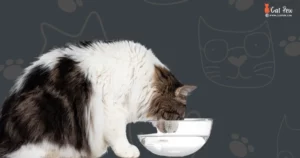
Cats can be notoriously fussy about their water consumption, and this can present several challenges for pet owners. Understanding the various issues that can affect a cat’s water consumption is crucial for ensuring their health and well-being.
Behavioral Issues
Cats are known for their independent nature, and this can extend to their drinking habits. Some cats may be picky about the type of water they drink or the location of their water bowl. Encouraging regular water intake can be a challenge, especially in multi-cat households where competition for resources may be a factor. Providing clean, fresh water in multiple locations throughout the home can help mitigate these behavioral issues.
Medical Conditions
Medical conditions such as kidney disease, diabetes, and urinary tract issues can impact a cat’s thirst and water consumption. Increased or decreased thirst can be a sign of an underlying medical problem, so monitoring your cat’s water intake is vital. If you notice any significant changes in their drinking habits, it’s essential to seek veterinary attention promptly to rule out any potential health issues.
7. Medical Concerns Related To Inadequate Hydration
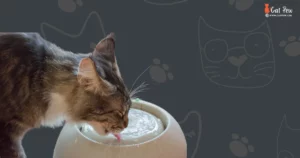
Inadequate hydration in cats can lead to various medical concerns, including urinary tract issues, kidney problems, and dehydration. Cats should drink approximately 3.5-4.5 ounces of water per 5 pounds of body weight daily to maintain proper hydration levels.
Ensuring that cats have access to fresh water and incorporating wet food into their diet can help prevent these issues.
Medical Concerns Related to Inadequate Hydration
Adequate hydration is crucial for a cat’s overall health and well-being. Inadequate water intake can lead to various medical concerns that can seriously impact a cat’s health. It is important to be mindful of these potential issues and take necessary measures to ensure your feline friend stays properly hydrated.
Kidney Diseases
Chronic dehydration in cats can significantly increase the risk of kidney diseases. Poor hydration can result in the formation of kidney stones and urinary crystals, which can lead to painful and potentially life-threatening conditions such as kidney failure. Additionally, insufficient water intake can impair the kidneys’ ability to filter waste products from the bloodstream, further exacerbating the risk of kidney-related complications.
Urinary Tract Health
Inadequate hydration can also contribute to urinary tract health issues in cats. Without sufficient water intake, urine becomes more concentrated, potentially leading to the development of urinary tract infections, inflammation of the bladder, or urinary obstructions. These conditions can cause discomfort and pain for the cat, and if left untreated, may progress to more severe complications.
In conclusion, ensuring that your cat receives adequate hydration is crucial for preventing a range of medical concerns, particularly those related to kidney diseases and urinary tract health. Making fresh water readily available and incorporating moisture-rich foods into your cat’s diet are essential steps in promoting proper hydration and safeguarding your cat’s well-being.
8. Hydration Tips
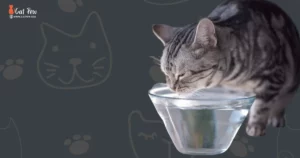
Cats should drink about 3.5-4.5 ounces of water per 5 pounds of body weight daily to stay hydrated. To encourage hydration, place multiple water bowls in various locations and consider a cat fountain. Wet food or adding water to dry food can also aid in boosting a cat’s water intake.
Recap Of Key Points
- Cats should consume approximately 3.5-4.5 ounces of water per 5 pounds of body weight per day.
- Factors such as diet, health, and environment play a role in the amount of water a cat needs.
- Monitoring water intake is crucial for early detection of health issues.
Practical Tips For Ensuring Adequate Hydration
Ensuring your feline friend stays adequately hydrated is essential for their well-being. Here are some practical tips to encourage hydration:
- Place multiple water dishes in various locations around the house to provide easy access.
- Use stainless steel or ceramic bowls to avoid altering the water’s taste and odor.
- Consider incorporating wet food into their diet, as it contains higher water content than dry food.
- Regularly clean and refill the water dishes to ensure freshness.
- Take note of your cat’s water intake and ensure it meets the recommended daily amount based on their weight.
Conclusion Of How Much Water Should A Cats Drink
Understanding your cat’s water intake is crucial for their health. By providing fresh and clean water, monitoring their daily consumption, and considering their diet, you can ensure your feline friend stays hydrated. Remember, each cat is unique, so consulting with your vet is key to maintaining their well-being.
Frequently Asked Questions On How Much Water Should A Cats Drink
How Much Water Should A Cat Drink Each Day?
Cats typically need 3.5 to 4.5 ounces of water per 5 pounds of body weight per day to stay hydrated. However, factors such as diet, activity level, and environment also play a role in determining their specific hydration needs.
Why Is It Important For Cats To Drink Enough Water?
Proper hydration helps maintain essential bodily functions, including kidney function and digestion and can prevent urinary tract issues. Failure to consume enough water can lead to dehydration, potentially resulting in serious health complications for cats.
What Are Some Ways To Encourage Cats To Drink More Water?
You can encourage your cat to drink more water by providing fresh water in a clean bowl, incorporating wet food into their diet, investing in a pet fountain, or offering water in various types of bowls to see which they prefer. Additionally, ensuring a quiet, private location for the water bowl can help entice them to drink more.
Can A Cat Drink Too Much Water?
Yes, excessive water consumption can be a sign of health issues such as diabetes or kidney disease. If you observe your cat drinking excessively, consult with a vet to rule out any potential health problems.
What Are The Signs Of Dehydration In Cats?
Watch for symptoms like lethargy, sunken eyes, dry gums, or sticky saliva. Dehydration can indicate an underlying health issue, so consult with a veterinarian if you notice these signs.
Can Health Conditions Affect A Cat’s Water Intake?
Yes, certain conditions like kidney disease, diabetes, or urinary tract issues can impact a cat’s water needs. If you suspect a health problem, consult your vet for proper diagnosis and treatment.
How Can I Monitor My Cat’s Water Intake?
Measure the amount of water you provide daily and observe changes. If you have multiple cats, monitor individual consumption to identify any variations.
Why Do Most Cats Dislike Water?
Cats generally have an aversion to water due to their evolutionary history. Unlike some water-loving animals, domestic cats’ ancestors were desert-dwelling creatures that didn’t have frequent exposure to water. As a result, many modern cats inherit a natural instinct to avoid water.

Winston
I'm Winston, the author of this feline-focused (Catpew.com) blog . My love for cats goes back to my childhood, when I spent countless hours playing with my family's tabby, Mittens. This furry friend instilled in me a deep appreciation for the unique personalities, playful nature, and unconditional love that cats offer.

